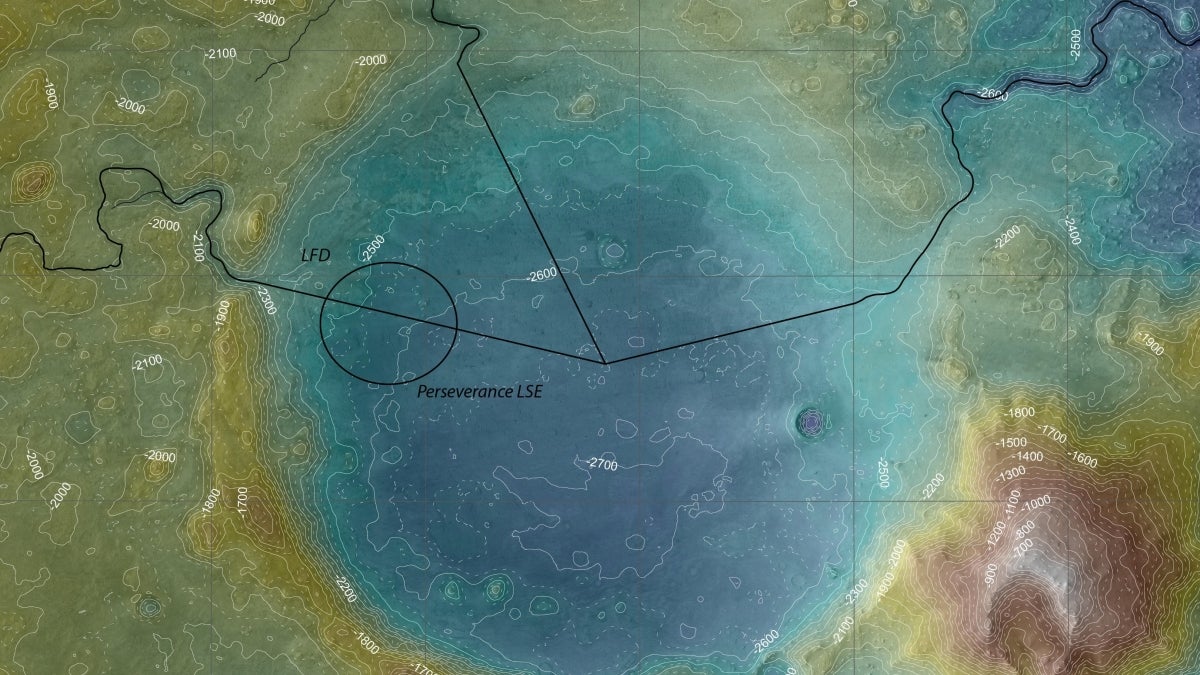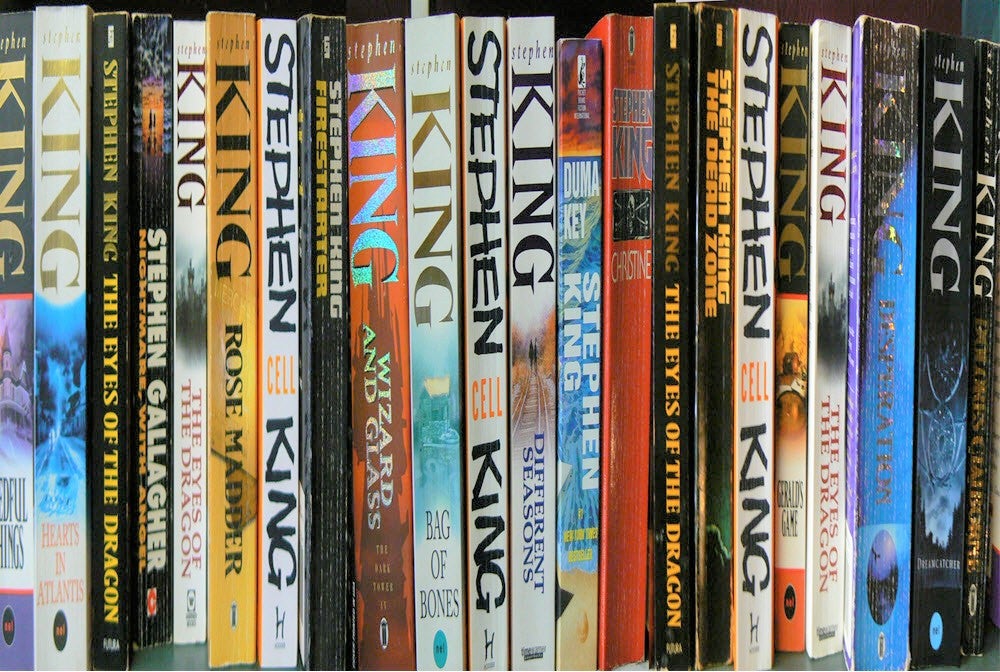We now know what the wind on Mars actually sounds like — to a robot’s “ears” anyway. Humans have been imagining this and other particulars of the red planet for decades, in music, visual art, literature and more. As we check in with NASA’s Perseverance rover throughout the next two Earth years, Arizona State University will offer a fall 2021 course exploring Martian-inspired texts.
Alternately taught by rhetorician Peter Goggin and literary scholar Joe Lockard (the latter will lead the course in fall 2021), ENG 369 Red Mirror – The Literature of Mars (class # 82800) reflects terrestrial anxieties about life, death, technology, civilization and the nature of the “other.” The syllabus includes “War of the Worlds” (both the story and the radio drama), Edgar Rice Burroughs’ “A Princess of Mars” (1917) and Matt Damon ... the 2015 Ridley Scott film “The Martian,” that is. The course is offered through ASU Online; beam in from wherever you are to participate.
If spending time in such uncanny valleys isn’t for you, read on for information about six other courses ASU English is rolling out for fall semester 2021. Some, like ENG 390 Listening to the Impossible, will delve into thorny contemporary issues; others, like ENG 346 The Nobel Prize will dabble in future-telling.
Registration information for these and a sampling of other fall semester classes is provided below. Find more in the ASU class schedule (search by “ENG,” “FMS,” “LIN” or “APL” prefixes), searchable by both online and in-person options.
1. ENG 349 Contemporary Literature: The Nobel Prize
Photo of a Nobel medal taken by David Monniaux. Image via Wikimedia Commons. Used under CC 3.0.
What it is: The times, they are a-changin’ — and nobody knew this better than Bob Dylan. Still, who could have guessed that times would change enough for Dylan to win the Nobel Prize in literature? Actually, students in an ASU class did. The fall 2021 iteration of ENG 349 will showcase work by Dylan and other Nobel laureates, including Kazuo Ishiguro, Svetlana Alexievich and Gabriel García Márquez. Students can also submit their predictions for the 2021 awards.
Why it matters: In an age of viral news and information overload, heady questions that this course strives to answer — such as “How does idealism survive despite the politics, marketing and scandals of international prize systems?” and “What counts as ‘literature’?” and “What values do today’s great writers offer?” — are all the more resonant. Plus: You get to predict the Nobel Prize!
Who’s in charge: For more than two decades, Professor Elizabeth Horan has been teaching this literature class. Horan has written or edited four books on Latin American Nobel laureate Gabriela Mistral; the most recent being “Preciadas Cartas (1932-1979)” (Editorial Renacimiento, 2019) with Carmen de Urioste Azcorra and Cynthia Tompkins, both professors in the School of International Letters and Cultures at ASU.
Who should take it: ENG 349 is open to undergraduates of any major with an interest in literature, fiction, nonfiction, music, poetry, global politics, language, writers and writing, or cultural prizes, and who have met basic first-year composition requirements.
If you register: ENG 349 The Nobel Prize (class # 91495) meets Tuesdays and Thursdays from 4:30 to 5:45 p.m. on ASU’s Tempe campus.
2. ENG 394 The Art of Popular Literature: Stephen King
An image of books by Stephen King by John Robinson on Flickr. Used under CC 2.0.
What it is: Aspiring writers can add to their bag of writer-tricks learned from the fiction they’ll read together in ENG 394. In this course, students learn to approach a text as writers, using the “King of Horror’s” work to pay heightened attention to the relationship between the way something is written (its form) and what it’s about (its content).
Why it matters: Like popular songs, popular or “genre” literature is often derided for its lack of literary merit. By considering both King’s short novels and his memoir on writing, students can explore how literary craft underpins the success of these bestselling narratives; and perhaps tap into that success themselves.
Who’s in charge: The course is taught by fiction writer and poet Laura Cruser and was designed in collaboration with Assistant Professor of English Jenny Irish, author of the hybrid story collection “Common Ancestor” (Black Lawrence Press, 2017) and the short story collection “I Am Faithful” (Black Lawrence Press, 2020).
Who should take it: ENG 394 is open to undergraduates of any major currently enrolled in ASU Online with interests in fiction, literature, popular culture, horror, science fiction, publishing, memoir or writing, and who have met basic first-year composition requirements.
If you register: ENG 394: Stephen King (class # 81794) is offered through ASU Online in Session B.
3. FMS 474: Women and Power in Media
Image of a Wonder Woman cosplayer at the 2018 WonderCon at the Anaheim Convention Center in California. Photo by Gage Skidmore on Flickr. Used under CC 2.0.
What it is: Students who relish the chance to discuss Wonder Woman, Alexandria Ocasio-Cortez and Janelle Monáe in the same breath will have the opportunity in this course. FMS 474 is a critical examination of how women and other feminized subjects function as protagonists in so-called “heroic” roles — whether as detectives, vigilantes, saviors or warriors — in film, television, music videos or other media. Ready to get your “Buffy” on?
Why it matters: How does gender influence the cultural selection of heroes or heroines? Are the rules the same for everyone? With “girl power” a fixture in contemporary media programming for children and adults, it’s important to learn how to interpret each iteration of the trope through the lens of its historical/social context.
Who’s in charge: Assistant Professor Aviva Dove-Viebahn is a specialist in film and media studies in the Department of English. She’s also a contributing editor at Ms. Magazine and the co-editor of “Gender, Race and Class: From the Pages of Ms. Magazine, 1972-Present,” 2nd ed. (Ms. Classroom, 2020).
Who should take it: This course is best for undergraduates of any major who have an interest in film and television, media, storytelling, analysis, history, cultural studies, popular culture, gender studies, sexuality or feminism, and who have met specific English and film course prerequisites; see course catalog for details.
If you register: FMS 474: Women and Power in Media (class # 92977) meets Tuesdays and Thursdays from noon to 1:15 p.m. on ASU’s Tempe campus.
4. ENG 390 Methods of Inquiry: Listening to the Impossible
Photograph of an eraser making the impossible, possible by Niklas Morberg on Flickr. Used under CC 2.0.
What it is: ENG 390 will explore a range of difficult issues, focusing not only on how to read impossible texts that direct and misdirect our attention in powerful ways, but also how to move beyond that text into action. Topics to be covered include trauma testimony, human trafficking, gender discrimination, racial violence and more via a reading list that includes authors Michael Eric Dyson (“Long Time Coming”), Art Spiegelman (“Maus”) and Alison Bechdel (“Fun Home”). Students in this course will learn how to hold an open stance toward difficult arguments, track their reasoning processes, identify their unstated assumptions, locate them within broader cultural logics, and then choose how best to proceed in light of their new understanding.
Why it matters: The media often bombard us with stories that, for one reason or another, are impossible to hear. Perhaps the story cuts across closely held political values, reports on incomprehensibly violent crimes, or simply repeats an argument so often that we grow numb to its details. It’s critical to learn how to slow down the argumentative process — via critical thinking, reading, writing and listening methods — so that we all can participate more fully in a complicated world.
Who’s in charge: The course is taught by Professor of English Kyle Jensen, who directs ASU’s Writing Programs and who is the author of “Reimagining Process” (Southern Illinois University Press, 2014) and co-editor of the forthcoming “Responding to the Sacred: An Inquiry into the Limits of Rhetoric” (Penn State University Press, 2021).
Who should take it: ENG 390 will appeal to undergraduates of any major with an interest in writing, rhetoric, literacy, communication, negotiation, mediation, research, language, public speaking, activism, contemporary issues, cultural studies, advocacy, media or journalism and who have met basic first-year composition requirements.
If you register: ENG 390 Listening to the Impossible (class # 78442) meets Tuesdays and Thursdays from 9 to 10:15 a.m. on ASU’s Tempe campus.
5. LIN 620 Advanced Studies in Second Language Acquisition: Emotion and Second Language Learning and Teaching
Emotion plays a role in learning. Photo by ASU Enterprise Marketing Hub, Ogilvy, 2020
What it is: While centered on the intellectual practice of language, this graduate-level linguistics course focuses on the dynamic relationship between emotion and language learning. Through readings, discussions, guest speakers and hands-on activities, students in LIN 620 will investigate how both language learners and language teachers shape and are shaped by their emotional worlds within and beyond the classroom. Topics to be covered include the relationship between emotion and cognition, anxiety, motivation, teacher burnout, positive psychology, empathy and more.
Why it matters: There is a newfound recognition that to understand the dynamic relationship between language and emotion is to understand what makes us human. Students who are armed with this knowledge can more effectively implement their own strategies for classroom success, as both learners and teachers.
Who’s in charge: Associate Professor Matthew Prior, who directs the program in linguistics and applied linguistics / TESOL at ASU, guides this course. Prior is the author of "Emotion and Discourse in L2 Narrative Research" (Multilingual Matters, 2015) and co-editor of "Emotion in Multilingual Interaction" (John Benjamins, 2016).
Who should take it: LIN 620 is appropriate for graduate students of any discipline with basic knowledge of and interest in second-language acquisition, educational psychology, linguistics and/or language education.
If you register: LIN 620 Emotion and Second Language Learning and Teaching (class # 91347) meets Tuesdays and Thursdays from 10:30 to 11:45 a.m. on ASU’s Tempe campus.
6. ENG 486 Teaching Text
Photo of the young adult collection in the Salem Public Library in Massachusetts. Via Flickr. Used under CC 2.0.
What it is: ENG 486 is a secondary education course all about what to teach and why. What counts as a text? How do I prepare students to read and work with a variety of texts? How can I effectively teach reading? Students in the course learn hands-on strategies for supporting all both struggling and avid readers and for teaching reading through a critical lens.
Why it matters: In our ever-changing and text-filled world, our students need to be critical readers of multiple kinds of texts and we want them to love that critical reading process.
Who’s in charge: This course is led by ASU English education doctoral student Rebecca Chatham, a veteran teacher and current president of the Arizona English Teachers Association, a statewide local affiliate of the National Council of Teachers of English.
Who should take it: ENG 486 is best for pre-service teachers or undergraduate students of any major with an interest in education — especially secondary education (grades 6-12) — and reading, writing, literature/young adult literature, or language arts who have met specific English course prerequisites; see course catalog for details.
If you register: ENG 486 Teaching Text (class # 91331) meets Thursdays from 4:30 to 7:15 p.m. on ASU’s Tempe campus.
This list is just a sampler of what you can explore in the Department of English, a unit in the Humanities Division of The College of Liberal Arts and Sciences, during fall 2021. Taught by award-winning faculty from myriad specialties, the courses cross disciplinary boundaries and are designed to reach students where they are.
Top image: In early 2021, NASA's Perseverance rover landed in the Jezero Crater on Mars. This topographic map of the landing site was created using observations from Mars Express’ High Resolution Stereo Camera (HRSC) and is courtesy of the European Space Agency. Image via Wikimedia used under CC 3.0.
More Law, journalism and politics
Can elections results be counted quickly yet reliably?
Election results that are released as quickly as the public demands but are reliable enough to earn wide acceptance may not always be possible.At least that's what a bipartisan panel of elections…
Spring break trip to Hawaiʻi provides insight into Indigenous law
A group of Arizona State University law students spent a week in Hawaiʻi for spring break. And while they did take in some of the sites, sounds and tastes of the tropical destination, the trip…

LA journalists and officials gather to connect and salute fire coverage
Recognition of Los Angeles-area media coverage of the region’s January wildfires was the primary message as hundreds gathered at ASU California Center Broadway for an annual convening of journalists…








